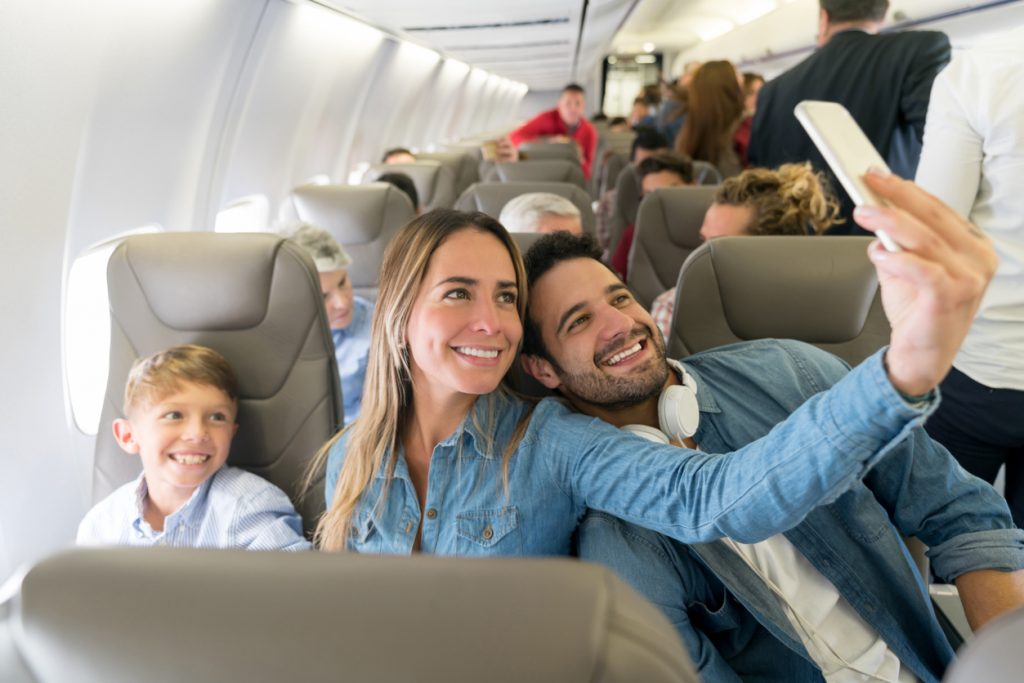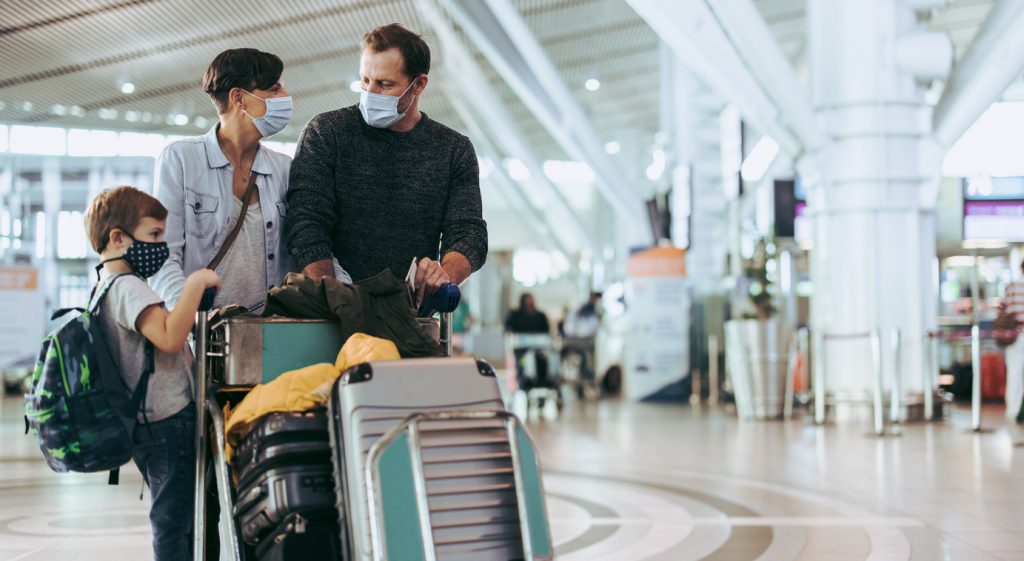5 top healthy travel tips from doctors
From dehydration and sleep deprivation to serious tropical diseases, getting sick while travelling is more common than you think. We asked our doctors to share their top 5 healthy travel tips to keep you and your family safe these holidays.

Given the spectrum of illnesses and ailments out there, it’s difficult to quantify just how many people are impacted. But the National Library of Medicine estimates that between 22 and 64 per cent of international travellers become sick during or after they travel.
On top of this, healthy lifestyle choices you practice at home often go by the wayside when you travel, particularly if you are on holiday. It’s easy to fall into the trap of eating more, enjoying a couple of extra cocktails, exercising less and ignoring your body’s natural sleep rhythms.
The good news is that there are simple and effective steps you can take to ensure you stay healthy exploring the globe – and when you return home – while still living your best holiday life.
1. What to do before you go
Staying healthy while on holiday begins months before your planned travel date. Here are some healthy travel tips:
Make sure you are fully vaccinated
Some countries have entry restrictions in place and may require you to show proof of your COVID-19 vaccination and booster shots. It’s a good idea to have a copy of your certificate of vaccination handy.
Other vaccines may also be required, particularly if you’re travelling to countries at high risk of tropical diseases. Be sure to visit a travel-focused medical expert well in advance of your trip to receive appropriate advice.
Manage your medicines
If you’re travelling with medication, particularly prescription drugs, it’s important to be organised and plan ahead so that you can maintain your normal schedule while you’re away.
- Fill prescriptions before you travel, to ensure you have a sufficient supply for the entire time you are away from home;
- Check that any medications (prescriptions and over-the-counter) you’re taking are legal in the destinations you’re travelling to;
- Keep medications in their original labelled containers, for your sake and the benefit of customs officials at the destinations you’re visiting;
- Consider carrying a letter from your doctor or a copy of your prescriptions for the same above reason, and also in case you misplace medications while away;
- When flying, always keep your medications in your carry-on luggage, in case your checked baggage is misplaced or you need access in an emergency;
- If flying, keep your medications together in a separate bag in your carry-on, to make them easier to access when it comes time to take them or present them to customs. Note that if you’re travelling by air, prescription medications are exempt from the 100ml carry-on restriction;
- If you’re travelling in the same time zone you live in, stick to your regular medication schedule. Otherwise, you may need to adjust the time of day you take your medication, accordingly;
- Consider the type of climate you’re staying in. Store your medication in a cool, dry place (avoid bathrooms), and if you’re in a particularly warm destination you might want to consider storing your medication in a fridge.
Pack a first-aid kit
Whether you’re travelling domestically or internationally, a well-stocked first-aid kit is essential.
Items for your check-list include:
- Antibacterial wipes and hand sanitiser;
- An instant cold pack;
- Self-adhesive wrap, bandages, gauze and band aids;
- Equipment like scissors, tweezers and a thermometer;
- SPF50+ sun-cream and aloe vera gel;
- DEET-containing insect repellent;

2. What to do when flying
While the risk of getting sick on a plane is lower than you think, you’re still in close proximity with other passengers, mingling in enclosed spaces and coming in direct contact with public objects.
It pays to be prepared when you’re flying by doing the following:
- Pack smart. In addition to your medications, make sure your carry-on is stocked with:
- Disinfectant wipes or sprays, to clean town tray tables and arm rests;
- Hand sanitiser;
- A face mask, for airports and airlines that require them;
- Immune-system booster
- An empty water bottle that you can refill on the plane and at airports.
- Choose a window seat. While aisle seats have benefits, they also come with drawbacks. You may be disturbed by your neighbour during sleep, and may also be exposed to more germs thanks to people (many coming back from the bathroom) walking up and down the aisle while grabbing onto the top of seats for support.
- Stay hydrated. Air on planes is recirculated and practically germ-free. But it is, however, very dry, so you need to consume more water than normal to stay hydrated. Avoid alcohol and caffeine, which can dehydrate and also impact sleep rhythms.
- Eat light, and pack healthy snacks. Whether on a plane or in a car, we tend to reach for unhealthy snacks when travelling – they’re uncomplicated, tasty and comforting. But healthy alternatives like fruit, nuts and air-popped popcorn are great alternatives. Just be sure to check quarantine restrictions at the destination you’re travelling to, if you have leftovers when crossing borders or disembarking planes.
3. Protect yourself from DVT (deep vein thrombosis)
Deep vein thrombosis (DVT) is a medical condition that occurs when a blood clot forms in a deep vein. Anything that prevents blood from flowing or properly clotting can cause a clot. Part of the clot can break off and travel to the lungs, causing a sudden blockage of arteries.
Travelling often includes sitting for periods of time, which can increase your chances of developing DVT. The risk is not confined to air travel; it increases with the duration of travel and is more common in those with pre-existing risk factors.
To avoid DVT when travelling, stand up and stretch your legs frequently, exercise your calf muscles and consider wearing compression socks.
4. How to avoid getting sick at your destination
Make sure you get adequate sleep
Whether travelling or not, getting a good night’s sleep is essential when it comes to staying healthy. After all, sleep gives your body and mind the chance to restore and revive. A lack of sleep, meanwhile, can have adverse physical and psychological symptoms, impacting your hormones, exercise performance and brain function.
Changing time zones and shifting routines when you travel can have a major impact on your sleep patterns.
Before you head off on your travels, try gradually shifting your sleep and wake times to approach that of your destination. Then when you arrive, spend as much time as you can outside. Studies show that being amid nature and sun exposure can help you adjust to the new time zone. Be sure to wear sunscreen.
Be sure to hydrate
On holiday, the cocktails are flowing and water is something you swim in, rather than drink. While travelling, it’s easy to lose track of hydration levels.
To avoid dehydration, carry a refillable water bottle wherever you go – many hotels have bubblers where you can top-up. Get a good head start to the day by drinking hot water with lemon before your morning coffee and breakfast, to reset your digestive system.

Be aware of how your food is prepared
Regardless of where you travel in the world, it’s a good idea to be conscious of how the food you’re eating is prepared. For example, if you’re travelling to a less developed country where water quality is an issue, you may want to avoid fruits and vegetables cleaned under taps; steer away from meats and dairy produce that has been sitting in the sun; and opt for bottled water, also when it comes to ice.
Be mindful of what you are consuming
You’re on holiday – time to indulge! The temptation to forget about your diet (particularly if you’re at an all-inclusive resort) is real. But overindulging can lead to sluggishness, weight gain and all manner of associated health issues. It’s better to follow the adage “quality over quantity”.
To avoid getting ill if you have dietary restrictions, consider carrying cards that clearly indicate the foods you cannot (or choose not to) eat.
Incorporate exercise into travel plans
Whether you’re travelling for work or pleasure, setting aside time for exercise can be a challenge – mental or physical. The excuses are endless: I have no time, I’m taking a break to relax, there are too many other fun things to do… But you will actually have more energy and feel more rested if you incorporate physical activity into your day.
Take advantage of a hotel gym or pool, do a brisk in-room app-based workout, jump in the ocean or exploring the sights on foot or bike instead of taking cabs. Exercise bolsters the immune system and releases feel-good endorphins.
Protect your skin
Sun on your skin can feel good. But you don’t want a painful sunburn putting a damper on your trip. Wherever you venture, pack protection from the sun, including a hat and an umbrella, SPF50+ sunscreen, and clothing that is light yet covers your limbs.
Look out for parasites
Parasitic illnesses or travel bugs are just one of the infectious and non-infectious diseases that travellers may acquire when away from home, perhaps through consuming contaminated food and drinks, through person-to-person contact or via the environment.
To avoid parasites, it’s a good idea to stick to bottled water (even when cleaning your teeth), and avoid ice and ice-cream. Don’t just be wary of water when drinking it – also be cautious when swimming in it. Avoid waterfalls, freshwater streams, lakes and rivers to reduce exposure to parasites.
5. What to do after you return
Returning to (and remaining in) health after you travel involves many of the steps you’ve become familiar with before and during your trip. Like staying hydrated, ensuring you’re consuming a healthy diet, prioritising sleep and grounding yourself in nature.
But there are a few other challenges thrown at you when you return from travels, such as post-holiday blues and the stress associated with returning to work or facing piles or unread emails, as well as plain old exhaustion – travelling can be tiring.
Be gentle with yourself, take time to breathe and practice mindfulness (ideally on an extra day off before returning to work) – remembering that the funk you’re in is temporary, and that your next vacation could be just around the corner.
If you need to talk to a doctor about any symptoms you may be experiencing, our Australian-registered doctors are available seven days a week from 6am to midnight.
To speak with an InstantScripts Doctor:
Request a ConsultationIf you have run out of your script:
Request a ScriptThis article was written by Natasha Dragun, she has been writing about travel, health and wellness for more than 20 years.
© InstantScripts
Level 8 / 637 Flinders St.,
Docklands VIC 3008

